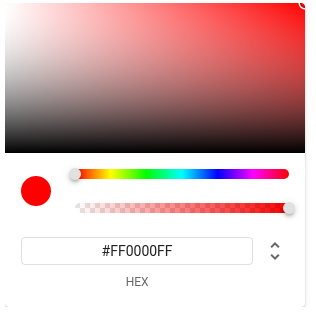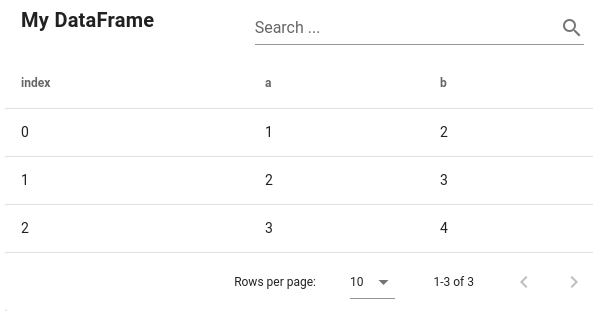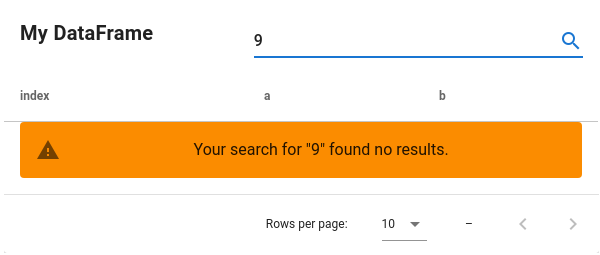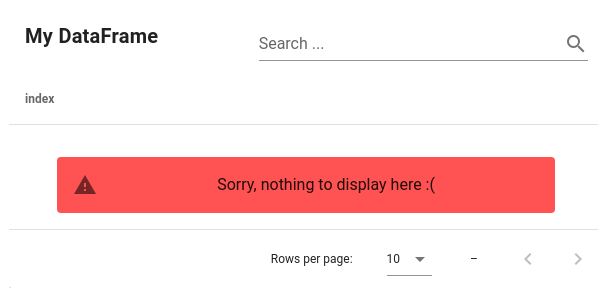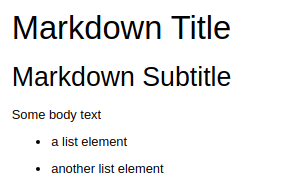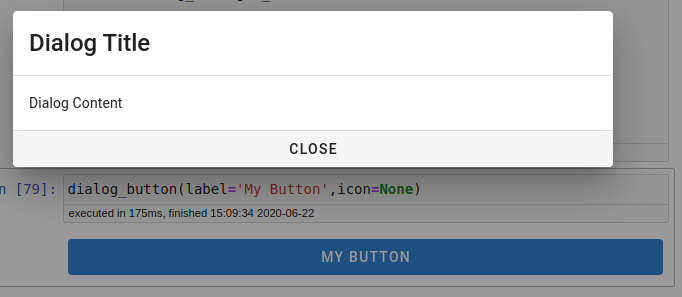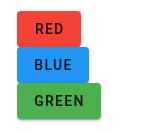Help on class Container in module ipyvuetify.generated.Container:
class Container(ipyvuetify.generated.VuetifyWidget.VuetifyWidget)
| Container(*args, **kwargs)
|
| Widget that can be inserted into the DOM
|
| Method resolution order:
| Container
| ipyvuetify.generated.VuetifyWidget.VuetifyWidget
| ipyvue.VueWidget.VueWidget
| ipywidgets.widgets.domwidget.DOMWidget
| ipywidgets.widgets.widget.Widget
| ipywidgets.widgets.widget.LoggingHasTraits
| traitlets.traitlets.HasTraits
| traitlets.traitlets.HasDescriptors
| ipyvue.VueWidget.Events
| builtins.object
|
| Data descriptors defined here:
|
| fluid
| A boolean (True, False) trait.
|
| id
| A trait for unicode strings.
|
| ma_0
| A boolean (True, False) trait.
|
| ma_1
| A boolean (True, False) trait.
|
| ma_2
| A boolean (True, False) trait.
|
| ma_3
| A boolean (True, False) trait.
|
| ma_4
| A boolean (True, False) trait.
|
| ma_5
| A boolean (True, False) trait.
|
| ma_auto
| A boolean (True, False) trait.
|
| mb_0
| A boolean (True, False) trait.
|
| mb_1
| A boolean (True, False) trait.
|
| mb_2
| A boolean (True, False) trait.
|
| mb_3
| A boolean (True, False) trait.
|
| mb_4
| A boolean (True, False) trait.
|
| mb_5
| A boolean (True, False) trait.
|
| mb_auto
| A boolean (True, False) trait.
|
| ml_0
| A boolean (True, False) trait.
|
| ml_1
| A boolean (True, False) trait.
|
| ml_2
| A boolean (True, False) trait.
|
| ml_3
| A boolean (True, False) trait.
|
| ml_4
| A boolean (True, False) trait.
|
| ml_5
| A boolean (True, False) trait.
|
| ml_auto
| A boolean (True, False) trait.
|
| mr_0
| A boolean (True, False) trait.
|
| mr_1
| A boolean (True, False) trait.
|
| mr_2
| A boolean (True, False) trait.
|
| mr_3
| A boolean (True, False) trait.
|
| mr_4
| A boolean (True, False) trait.
|
| mr_5
| A boolean (True, False) trait.
|
| mr_auto
| A boolean (True, False) trait.
|
| mt_0
| A boolean (True, False) trait.
|
| mt_1
| A boolean (True, False) trait.
|
| mt_2
| A boolean (True, False) trait.
|
| mt_3
| A boolean (True, False) trait.
|
| mt_4
| A boolean (True, False) trait.
|
| mt_5
| A boolean (True, False) trait.
|
| mt_auto
| A boolean (True, False) trait.
|
| mx_0
| A boolean (True, False) trait.
|
| mx_1
| A boolean (True, False) trait.
|
| mx_2
| A boolean (True, False) trait.
|
| mx_3
| A boolean (True, False) trait.
|
| mx_4
| A boolean (True, False) trait.
|
| mx_5
| A boolean (True, False) trait.
|
| mx_auto
| A boolean (True, False) trait.
|
| my_0
| A boolean (True, False) trait.
|
| my_1
| A boolean (True, False) trait.
|
| my_2
| A boolean (True, False) trait.
|
| my_3
| A boolean (True, False) trait.
|
| my_4
| A boolean (True, False) trait.
|
| my_5
| A boolean (True, False) trait.
|
| my_auto
| A boolean (True, False) trait.
|
| pa_0
| A boolean (True, False) trait.
|
| pa_1
| A boolean (True, False) trait.
|
| pa_2
| A boolean (True, False) trait.
|
| pa_3
| A boolean (True, False) trait.
|
| pa_4
| A boolean (True, False) trait.
|
| pa_5
| A boolean (True, False) trait.
|
| pa_auto
| A boolean (True, False) trait.
|
| pb_0
| A boolean (True, False) trait.
|
| pb_1
| A boolean (True, False) trait.
|
| pb_2
| A boolean (True, False) trait.
|
| pb_3
| A boolean (True, False) trait.
|
| pb_4
| A boolean (True, False) trait.
|
| pb_5
| A boolean (True, False) trait.
|
| pb_auto
| A boolean (True, False) trait.
|
| pl_0
| A boolean (True, False) trait.
|
| pl_1
| A boolean (True, False) trait.
|
| pl_2
| A boolean (True, False) trait.
|
| pl_3
| A boolean (True, False) trait.
|
| pl_4
| A boolean (True, False) trait.
|
| pl_5
| A boolean (True, False) trait.
|
| pl_auto
| A boolean (True, False) trait.
|
| pr_0
| A boolean (True, False) trait.
|
| pr_1
| A boolean (True, False) trait.
|
| pr_2
| A boolean (True, False) trait.
|
| pr_3
| A boolean (True, False) trait.
|
| pr_4
| A boolean (True, False) trait.
|
| pr_5
| A boolean (True, False) trait.
|
| pr_auto
| A boolean (True, False) trait.
|
| pt_0
| A boolean (True, False) trait.
|
| pt_1
| A boolean (True, False) trait.
|
| pt_2
| A boolean (True, False) trait.
|
| pt_3
| A boolean (True, False) trait.
|
| pt_4
| A boolean (True, False) trait.
|
| pt_5
| A boolean (True, False) trait.
|
| pt_auto
| A boolean (True, False) trait.
|
| px_0
| A boolean (True, False) trait.
|
| px_1
| A boolean (True, False) trait.
|
| px_2
| A boolean (True, False) trait.
|
| px_3
| A boolean (True, False) trait.
|
| px_4
| A boolean (True, False) trait.
|
| px_5
| A boolean (True, False) trait.
|
| px_auto
| A boolean (True, False) trait.
|
| py_0
| A boolean (True, False) trait.
|
| py_1
| A boolean (True, False) trait.
|
| py_2
| A boolean (True, False) trait.
|
| py_3
| A boolean (True, False) trait.
|
| py_4
| A boolean (True, False) trait.
|
| py_5
| A boolean (True, False) trait.
|
| py_auto
| A boolean (True, False) trait.
|
| tag
| A trait for unicode strings.
|
| ----------------------------------------------------------------------
| Data descriptors inherited from ipyvue.VueWidget.VueWidget:
|
| attributes
| An instance of a Python dict.
|
| One or more traits can be passed to the constructor
| to validate the keys and/or values of the dict.
| If you need more detailed validation,
| you may use a custom validator method.
|
| .. versionchanged:: 5.0
| Added key_trait for validating dict keys.
|
| .. versionchanged:: 5.0
| Deprecated ambiguous ``trait``, ``traits`` args in favor of ``value_trait``, ``per_key_traits``.
|
| children
| An instance of a Python list.
|
| class_
| A trait for unicode strings.
|
| slot
| A trait for unicode strings.
|
| style_
| A trait for unicode strings.
|
| v_model
| A trait which allows any value.
|
| v_on
| A trait for unicode strings.
|
| v_slots
| An instance of a Python list.
|
| ----------------------------------------------------------------------
| Methods inherited from ipywidgets.widgets.domwidget.DOMWidget:
|
| add_class(self, className)
| Adds a class to the top level element of the widget.
|
| Doesn't add the class if it already exists.
|
| remove_class(self, className)
| Removes a class from the top level element of the widget.
|
| Doesn't remove the class if it doesn't exist.
|
| ----------------------------------------------------------------------
| Data descriptors inherited from ipywidgets.widgets.domwidget.DOMWidget:
|
| layout
| An instance trait which coerces a dict to an instance.
|
| This lets the instance be specified as a dict, which is used
| to initialize the instance.
|
| Also, we default to a trivial instance, even if args and kwargs
| is not specified.
|
| ----------------------------------------------------------------------
| Methods inherited from ipywidgets.widgets.widget.Widget:
|
| __del__(self)
| Object disposal
|
| __init__(self, **kwargs)
| Public constructor
|
| __repr__(self)
| Return repr(self).
|
| add_traits(self, **traits)
| Dynamically add trait attributes to the Widget.
|
| close(self)
| Close method.
|
| Closes the underlying comm.
| When the comm is closed, all of the widget views are automatically
| removed from the front-end.
|
| get_state(self, key=None, drop_defaults=False)
| Gets the widget state, or a piece of it.
|
| Parameters
| ----------
| key : unicode or iterable (optional)
| A single property's name or iterable of property names to get.
|
| Returns
| -------
| state : dict of states
| metadata : dict
| metadata for each field: {key: metadata}
|
| get_view_spec(self)
|
| hold_sync(self)
| Hold syncing any state until the outermost context manager exits
|
| notify_change(self, change)
| Called when a property has changed.
|
| on_displayed(self, callback, remove=False)
| (Un)Register a widget displayed callback.
|
| Parameters
| ----------
| callback: method handler
| Must have a signature of::
|
| callback(widget, **kwargs)
|
| kwargs from display are passed through without modification.
| remove: bool
| True if the callback should be unregistered.
|
| on_msg(self, callback, remove=False)
| (Un)Register a custom msg receive callback.
|
| Parameters
| ----------
| callback: callable
| callback will be passed three arguments when a message arrives::
|
| callback(widget, content, buffers)
|
| remove: bool
| True if the callback should be unregistered.
|
| open(self)
| Open a comm to the frontend if one isn't already open.
|
| send(self, content, buffers=None)
| Sends a custom msg to the widget model in the front-end.
|
| Parameters
| ----------
| content : dict
| Content of the message to send.
| buffers : list of binary buffers
| Binary buffers to send with message
|
| send_state(self, key=None)
| Sends the widget state, or a piece of it, to the front-end, if it exists.
|
| Parameters
| ----------
| key : unicode, or iterable (optional)
| A single property's name or iterable of property names to sync with the front-end.
|
| set_state(self, sync_data)
| Called when a state is received from the front-end.
|
| ----------------------------------------------------------------------
| Class methods inherited from ipywidgets.widgets.widget.Widget:
|
| close_all() from traitlets.traitlets.MetaHasTraits
|
| ----------------------------------------------------------------------
| Static methods inherited from ipywidgets.widgets.widget.Widget:
|
| get_manager_state(drop_defaults=False, widgets=None)
| Returns the full state for a widget manager for embedding
|
| :param drop_defaults: when True, it will not include default value
| :param widgets: list with widgets to include in the state (or all widgets when None)
| :return:
|
| handle_comm_opened(comm, msg)
| Static method, called when a widget is constructed.
|
| on_widget_constructed(callback)
| Registers a callback to be called when a widget is constructed.
|
| The callback must have the following signature:
| callback(widget)
|
| ----------------------------------------------------------------------
| Readonly properties inherited from ipywidgets.widgets.widget.Widget:
|
| model_id
| Gets the model id of this widget.
|
| If a Comm doesn't exist yet, a Comm will be created automagically.
|
| ----------------------------------------------------------------------
| Data descriptors inherited from ipywidgets.widgets.widget.Widget:
|
| comm
| A trait whose value must be an instance of a specified class.
|
| The value can also be an instance of a subclass of the specified class.
|
| Subclasses can declare default classes by overriding the klass attribute
|
| keys
| An instance of a Python list.
|
| ----------------------------------------------------------------------
| Data and other attributes inherited from ipywidgets.widgets.widget.Widget:
|
| widget_types = <ipywidgets.widgets.widget.WidgetRegistry object>
|
| widgets = {'01d4a1e490bb4c17ab19061e2b028f6d': DescriptionStyle(), '04...
|
| ----------------------------------------------------------------------
| Data descriptors inherited from ipywidgets.widgets.widget.LoggingHasTraits:
|
| log
| A trait whose value must be an instance of a specified class.
|
| The value can also be an instance of a subclass of the specified class.
|
| Subclasses can declare default classes by overriding the klass attribute
|
| ----------------------------------------------------------------------
| Methods inherited from traitlets.traitlets.HasTraits:
|
| __getstate__(self)
|
| __setstate__(self, state)
|
| has_trait(self, name)
| Returns True if the object has a trait with the specified name.
|
| hold_trait_notifications(self)
| Context manager for bundling trait change notifications and cross
| validation.
|
| Use this when doing multiple trait assignments (init, config), to avoid
| race conditions in trait notifiers requesting other trait values.
| All trait notifications will fire after all values have been assigned.
|
| observe(self, handler, names=traitlets.All, type='change')
| Setup a handler to be called when a trait changes.
|
| This is used to setup dynamic notifications of trait changes.
|
| Parameters
| ----------
| handler : callable
| A callable that is called when a trait changes. Its
| signature should be ``handler(change)``, where ``change`` is a
| dictionary. The change dictionary at least holds a 'type' key.
| * ``type``: the type of notification.
| Other keys may be passed depending on the value of 'type'. In the
| case where type is 'change', we also have the following keys:
| * ``owner`` : the HasTraits instance
| * ``old`` : the old value of the modified trait attribute
| * ``new`` : the new value of the modified trait attribute
| * ``name`` : the name of the modified trait attribute.
| names : list, str, All
| If names is All, the handler will apply to all traits. If a list
| of str, handler will apply to all names in the list. If a
| str, the handler will apply just to that name.
| type : str, All (default: 'change')
| The type of notification to filter by. If equal to All, then all
| notifications are passed to the observe handler.
|
| on_trait_change(self, handler=None, name=None, remove=False)
| DEPRECATED: Setup a handler to be called when a trait changes.
|
| This is used to setup dynamic notifications of trait changes.
|
| Static handlers can be created by creating methods on a HasTraits
| subclass with the naming convention '_[traitname]_changed'. Thus,
| to create static handler for the trait 'a', create the method
| _a_changed(self, name, old, new) (fewer arguments can be used, see
| below).
|
| If `remove` is True and `handler` is not specified, all change
| handlers for the specified name are uninstalled.
|
| Parameters
| ----------
| handler : callable, None
| A callable that is called when a trait changes. Its
| signature can be handler(), handler(name), handler(name, new),
| handler(name, old, new), or handler(name, old, new, self).
| name : list, str, None
| If None, the handler will apply to all traits. If a list
| of str, handler will apply to all names in the list. If a
| str, the handler will apply just to that name.
| remove : bool
| If False (the default), then install the handler. If True
| then unintall it.
|
| set_trait(self, name, value)
| Forcibly sets trait attribute, including read-only attributes.
|
| setup_instance(*args, **kwargs)
| This is called **before** self.__init__ is called.
|
| trait_defaults(self, *names, **metadata)
| Return a trait's default value or a dictionary of them
|
| Notes
| -----
| Dynamically generated default values may
| depend on the current state of the object.
|
| trait_has_value(self, name)
| Returns True if the specified trait has a value.
|
| This will return false even if ``getattr`` would return a
| dynamically generated default value. These default values
| will be recognized as existing only after they have been
| generated.
|
| Example
|
| .. code-block:: python
|
| class MyClass(HasTraits):
| i = Int()
|
| mc = MyClass()
| assert not mc.trait_has_value("i")
| mc.i # generates a default value
| assert mc.trait_has_value("i")
|
| trait_metadata(self, traitname, key, default=None)
| Get metadata values for trait by key.
|
| trait_names(self, **metadata)
| Get a list of all the names of this class' traits.
|
| trait_values(self, **metadata)
| A ``dict`` of trait names and their values.
|
| The metadata kwargs allow functions to be passed in which
| filter traits based on metadata values. The functions should
| take a single value as an argument and return a boolean. If
| any function returns False, then the trait is not included in
| the output. If a metadata key doesn't exist, None will be passed
| to the function.
|
| Returns
| -------
| A ``dict`` of trait names and their values.
|
| Notes
| -----
| Trait values are retrieved via ``getattr``, any exceptions raised
| by traits or the operations they may trigger will result in the
| absence of a trait value in the result ``dict``.
|
| traits(self, **metadata)
| Get a ``dict`` of all the traits of this class. The dictionary
| is keyed on the name and the values are the TraitType objects.
|
| The TraitTypes returned don't know anything about the values
| that the various HasTrait's instances are holding.
|
| The metadata kwargs allow functions to be passed in which
| filter traits based on metadata values. The functions should
| take a single value as an argument and return a boolean. If
| any function returns False, then the trait is not included in
| the output. If a metadata key doesn't exist, None will be passed
| to the function.
|
| unobserve(self, handler, names=traitlets.All, type='change')
| Remove a trait change handler.
|
| This is used to unregister handlers to trait change notifications.
|
| Parameters
| ----------
| handler : callable
| The callable called when a trait attribute changes.
| names : list, str, All (default: All)
| The names of the traits for which the specified handler should be
| uninstalled. If names is All, the specified handler is uninstalled
| from the list of notifiers corresponding to all changes.
| type : str or All (default: 'change')
| The type of notification to filter by. If All, the specified handler
| is uninstalled from the list of notifiers corresponding to all types.
|
| unobserve_all(self, name=traitlets.All)
| Remove trait change handlers of any type for the specified name.
| If name is not specified, removes all trait notifiers.
|
| ----------------------------------------------------------------------
| Class methods inherited from traitlets.traitlets.HasTraits:
|
| class_own_trait_events(name) from traitlets.traitlets.MetaHasTraits
| Get a dict of all event handlers defined on this class, not a parent.
|
| Works like ``event_handlers``, except for excluding traits from parents.
|
| class_own_traits(**metadata) from traitlets.traitlets.MetaHasTraits
| Get a dict of all the traitlets defined on this class, not a parent.
|
| Works like `class_traits`, except for excluding traits from parents.
|
| class_trait_names(**metadata) from traitlets.traitlets.MetaHasTraits
| Get a list of all the names of this class' traits.
|
| This method is just like the :meth:`trait_names` method,
| but is unbound.
|
| class_traits(**metadata) from traitlets.traitlets.MetaHasTraits
| Get a ``dict`` of all the traits of this class. The dictionary
| is keyed on the name and the values are the TraitType objects.
|
| This method is just like the :meth:`traits` method, but is unbound.
|
| The TraitTypes returned don't know anything about the values
| that the various HasTrait's instances are holding.
|
| The metadata kwargs allow functions to be passed in which
| filter traits based on metadata values. The functions should
| take a single value as an argument and return a boolean. If
| any function returns False, then the trait is not included in
| the output. If a metadata key doesn't exist, None will be passed
| to the function.
|
| trait_events(name=None) from traitlets.traitlets.MetaHasTraits
| Get a ``dict`` of all the event handlers of this class.
|
| Parameters
| ----------
| name : str (default: None)
| The name of a trait of this class. If name is ``None`` then all
| the event handlers of this class will be returned instead.
|
| Returns
| -------
| The event handlers associated with a trait name, or all event handlers.
|
| ----------------------------------------------------------------------
| Readonly properties inherited from traitlets.traitlets.HasTraits:
|
| cross_validation_lock
| A contextmanager for running a block with our cross validation lock set
| to True.
|
| At the end of the block, the lock's value is restored to its value
| prior to entering the block.
|
| ----------------------------------------------------------------------
| Static methods inherited from traitlets.traitlets.HasDescriptors:
|
| __new__(*args, **kwargs)
| Create and return a new object. See help(type) for accurate signature.
|
| ----------------------------------------------------------------------
| Data descriptors inherited from traitlets.traitlets.HasDescriptors:
|
| __dict__
| dictionary for instance variables (if defined)
|
| __weakref__
| list of weak references to the object (if defined)
|
| ----------------------------------------------------------------------
| Methods inherited from ipyvue.VueWidget.Events:
|
| fire_event(self, event, data)
|
| on_event(self, event_and_modifiers, callback, remove=False)



















